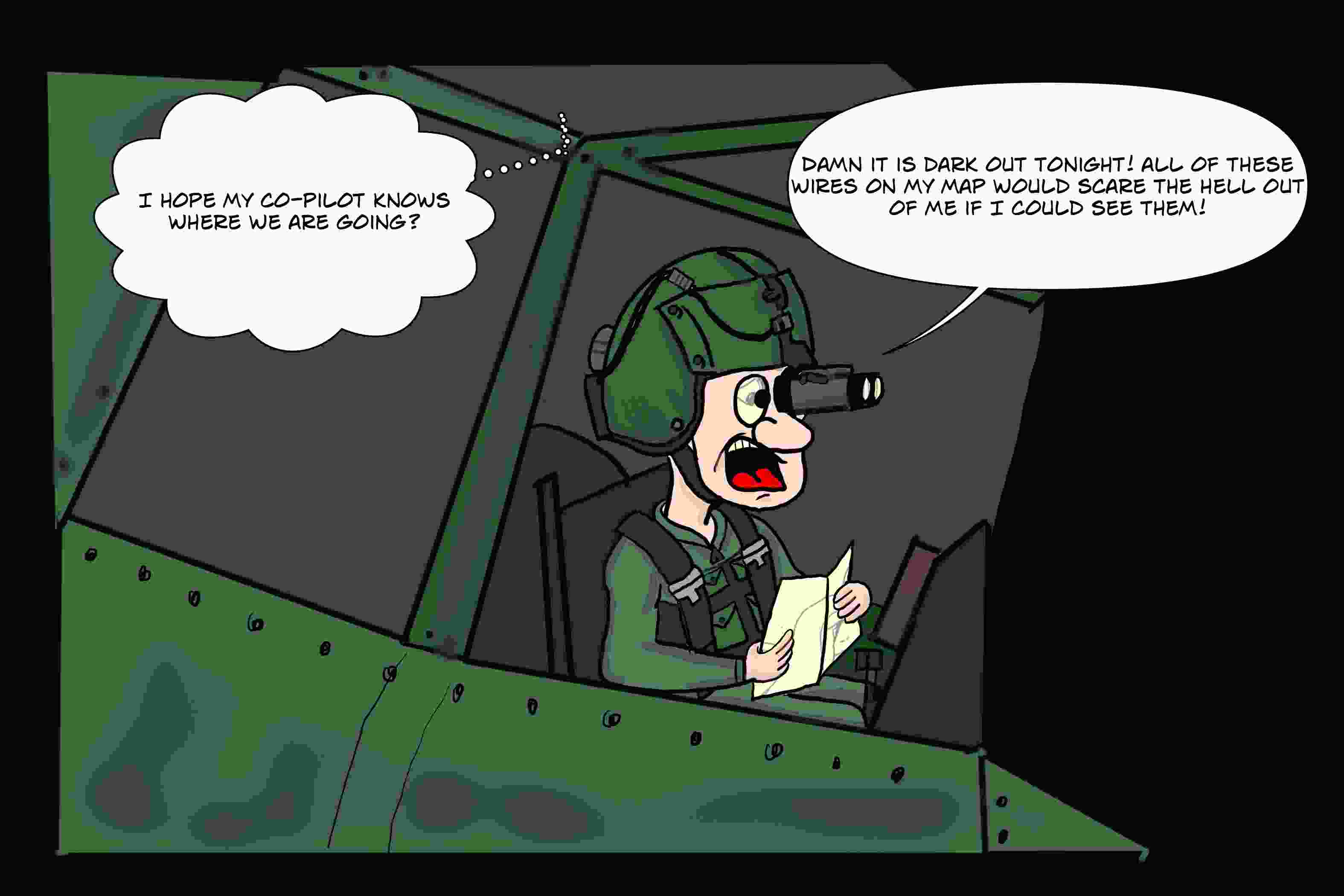Don't miss our flash to bang SALES!
Army Warrant Officer Apache Longbow pilot worried about wires

Army Warrant Officer pilot worried about wires while flying at night in an AH-64 Apache Longbow attack helicopter. Wires are difficult to see at night especially on a dark night. Even with Night Vision Googles (NVGs) or a FLIR device avoiding wires was somewhat stressful. We also called wires “chopper stoppers”. This Army humor comic is not actually a funny joke because avoiding wire strikes requires vigilance and a bit of luck.
Army Warrant Officer Apache Longbow pilot worried about wires
It was one of those nights—the kind so pitch-black that even the stars seemed to have clocked out early. I was sitting in the front seat of my AH-64 Apache Longbow attack helicopter, night vision goggles strapped to my face, peering into the endless abyss. It was a routine mission, if you could call anything routine when you’re flying what’s essentially a flying tank through the sky at night. And by flying tank, I mean a tank that can shred anything in its path… unless, of course, it hits a wire.
Ah yes, wires—every helicopter pilot’s favorite airborne obstacle. They were dubbed “chopper stoppers” for a reason, and let me tell you, they did not come with flashing neon signs saying, “Hey, pilot, don’t hit me!” No, wires were more like those sneaky tripwires you don’t notice until it’s too late and you’re suddenly upside down wondering where your rotors went.
On this particular night, the weather was perfect for wire-related nightmares: dark, a bit of haze, and the occasional distant flicker of lightning that only served to remind me how little I could actually see. Even with the NVGs and FLIR (Forward-Looking Infrared Radar) helping me spot heat signatures, wires were the one thing those fancy toys couldn’t do much about. Wires were cold, sneaky, and just waiting for some unlucky fool to cross their path.
My co-pilot, Chief Warrant Officer Johnson, was sitting in the backseat. He was the kind of guy who was as laid-back as they came—until wires were involved. We hadn’t said much in the last twenty minutes, but I could feel his tension creeping up on me through the intercom.
“You see any wires?” he asked, in that way pilots do when they’re nervous but don’t want to admit they’re nervous.
“Nope. But that doesn’t mean they aren’t there,” I replied, scanning the horizon like a hawk that’s lost its contacts.
“Great. Perfect. You know, I once had a guy tell me that flying at night was relaxing,” Johnson muttered. “I think he’s in therapy now.”
We continued on, the hum of the rotors filling the silence. My eyes were darting back and forth, searching for anything that could remotely resemble a wire. I kept imagining them popping up out of nowhere like some kind of demonic jump scare.
“Hey, do me a favor,” Johnson piped up again. “If you see a wire, just… don’t hit it, okay?”
“Oh, really? That’s the plan?” I shot back. “I was thinking of just barreling right into one. You know, for fun. Maybe try to collect a few as souvenirs.”
“You joke, but I swear I’ve had dreams where I’m just flying along, minding my own business, and suddenly—WHAM—wires everywhere. Like some kind of horrible, invisible spider web.”
“Yeah, well, let’s hope tonight’s not the night we test the durability of this thing against a set of power lines.”
As we neared the next waypoint, Johnson’s voice cracked over the intercom again. “You ever notice that wires are like the most useless things when you’re not flying, but the second you get up in the air, they turn into lethal death traps?”
I chuckled, “Right? Nobody ever worries about wires until you’re flying a multimillion-dollar attack helicopter at 200 feet in the dark. What’s worse is they blend in with everything—trees, buildings, the horizon. It’s like they were designed to make us sweat.”
“You think they’d just make ’em glow or something,” Johnson quipped. “Or, better yet, stop hanging them in the middle of nowhere.”
“That would require logic, my friend, and we both know the Army isn’t big on that.”
We shared a nervous laugh, both knowing that humor was our best defense against the creeping dread of potential wire strikes. As we flew over a small village, I noticed a faint line crossing our path. My stomach did a little flip, and I tightened my grip on the stick.
“Uh, Johnson, I think I see something.”
There was a beat of silence before he replied. “Is it a wire?”
“It’s… a wire.”
“Of course it is. Because why wouldn’t there be a wire in the middle of this godforsaken place?”
I adjusted our altitude, giving the wire plenty of room. As we passed safely over it, I let out a breath I didn’t realize I’d been holding.
“See? No big deal,” I said, trying to sound more confident than I felt.
Johnson exhaled loudly. “Yeah, but now I’ll spend the rest of the night imagining all the other wires we didn’t see. It’s like flying through a spider web, man—once you feel one, you keep thinking they’re all over you.”
I couldn’t help but laugh. “Hey, at least we’re not the front-seater crash dummies. I’ll take my chances in the back, thank you very much.”
“Fair point,” Johnson admitted. “But let’s agree to keep dodging these things, shall we? No sense in becoming a ‘chopper stopper’ statistic tonight.”
And so, we continued our mission, weaving through the sky like paranoid bats in the dark, ever on the lookout for the invisible menace. Because in the Army, flying an Apache wasn’t just about firepower—it was about surviving the world’s sneakiest enemy: wires.
The End
Check out the awesome selection of military-themed shirts, mugs, and posters at The Frontlines Shop—and don’t miss all the great stuff we’ve got on sale right now! Plus, believe it or not, some of the comics I whipped up during my 20-year military career have actually been published! These funny and sometimes edgy reflections are inspired by amazing mentors, great friends, and a deep appreciation for sarcasm. You can find them on Amazon The Frontlines
Popular Products
-

Lift Equation
Price range: $19.50 through $28.00 Select options This product has multiple variants. The options may be chosen on the product page -

SOS Emergency Orange
Price range: $20.00 through $28.50 Select options This product has multiple variants. The options may be chosen on the product page -

Rescue Swimmer Definition Hoodie
Price range: $45.50 through $58.00 Select options This product has multiple variants. The options may be chosen on the product page -

Warning – No Rescue Swimmer
Price range: $12.50 through $17.00 Select options This product has multiple variants. The options may be chosen on the product page




